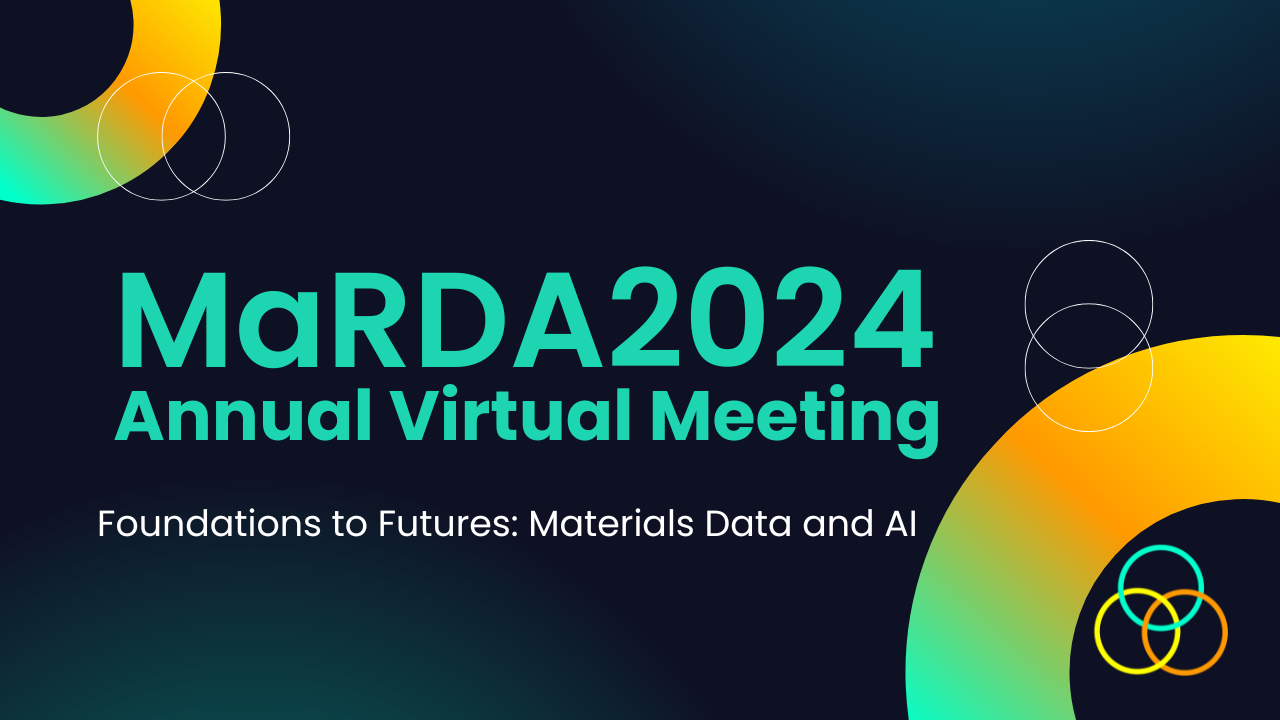
MaRDA's Fourth Annual Virtual Meeting Reaffirms Commitment to Open Data and AI Integration in Materials Science
Esteemed guests and experts highlight the role of open data in advancing AI and ML applications, addressing industry challenges, and enhancing educational practices.
Author: Salena Fitzgerald
Co-Authors: Debbie Audus, Corey Oses
The Materials Research Data Alliance (MaRDA) successfully concluded its fourth annual virtual meeting, reaffirming its commitment to connecting and integrating U.S materials research data infrastructure. This year’s event, held over three days in February, featured esteemed guests from institutions including NIST, Meta AI, LIFT, and prestigious universities. The meeting spotlighted the critical role of open data in advancing applications of Artificial Intelligence (AI) and Machine Learning (ML) in materials science.
The event commenced with a session themed “Enabling the Future through Open Materials Data and AI,” underscoring the necessity of open data practices and their impact on the future of AI and machine learning (ML) applications within materials research. From fostering a culture of data sharing to empowering the next generation of researchers through comprehensive training, the discussions on day one set the tone for an engaging and enlightening event.
As the sessions unfolded, participants delved into the intersection of Large Language Models (LLM) and materials data, exploring opportunities and challenges in data extraction from literature and the integration of multimodal approaches combining text and images. Notably, a committee of LLMs was highlighted for its superior performance in data extraction tasks, signaling promising prospects for obtaining high-quality datasets from literature in the field of materials research.
The role of algorithms and data in industry and translation took center stage during session four, where panelists from academia and industry shared insights on overcoming challenges in translating research findings into real-world applications. Discussions touched on the “valley of death” between basic research and product development, emphasizing the need for automation, early stakeholder engagement, and robust data management practices to accelerate innovation and manufacturing processes.
The topic shifted focus to the impact of AI and data sciences on education, with educators and researchers exploring opportunities for reform in pedagogical approaches and curriculum design. As AI technologies continue to evolve, educators highlighted the potential of these tools to enhance student learning experiences while emphasizing the importance of clear guidelines on their integration into academic settings.
In addition to the engaging sessions, the meeting featured poster presentations, materials data platform showcases, and updates from working groups within the MaRDA community. Two standout posters were recognized for their contributions to materials research, showcasing innovative approaches to data management and ontology development.
-
- Rushik Desai, Graduate student, Purdue University | Multi-component, multi-phase Perovskite Database
-
- Vineeth Venugopal, Postdoctoral Research Fellow, Massachusetts Institute of Technology | MatKG-2: Unveiling precise material science ontology through autonomous committees of LLMs
The working group sessions provided valuable insights into ongoing collaborative efforts within the MaRDA community, addressing key areas such as metadata extraction, laboratory information management systems (LIMS), microscopy, phase field metadata, and training initiatives. These initiatives underscored the commitment of MaRDA to driving progress towards open, accessible, and interoperable material data infrastructure.
As the meeting ended, participants left with a renewed sense of purpose and commitment to advancing materials research through open data practices and AI integration.
Looking ahead, MaRDA remains dedicated to fostering collaboration, driving innovation, and shaping the future of materials science in an increasingly data-driven world.
You can review the MaRDA2024 agenda here.